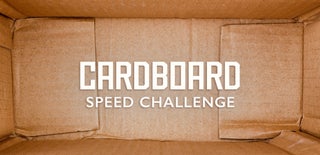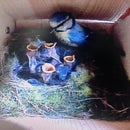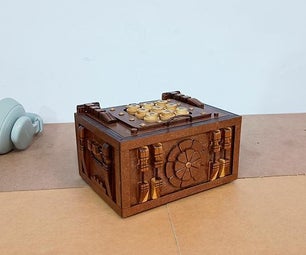Introduction: DIY Cardboard Loop-The-Loop - for Toy Cars
With Lockdown in full effect, I find myself with more Amazon boxes, and wondering what else I can do with them. Like any Dad, it'd be laughable to claim that I do all this 'for my Son', as evidently, I'm having as much fun as him.
Not that I had a childhood of hardship, but my folks were never up for buying the HotWheels Loop-the-Loop set for me, and in truth, I do get it (creativity, less consumerism, etc. etc.) but a small part of me clearly still wanted to just experience that awesomeness of seeing my toy card do something seemingly impossible.
In fact, this is so 'gravity defying' that when I first showed it to my Son, there was a long pause (for him!) of a few second, before exploding with excitement. It's like you could see the kid-equivalent of 'WTAF!?" going through his head. I was very proud.
Oddly enough - the main reason I was compelled to do this, was that I was asked to author a series of Lockdown Lectures on Prototyping and User Research, for Bangor University in Wales. And I took it upon myself to 'walk the talk' and actually make a quick prototype of a game I wanted to play with my Son, and test and refine the design. In Lockdown of course cardboard is a constraint, but even when I worked at Dyson, card was a regular medium for first prototypes and explorations. So I love that this does all that, and is fun too.
So whatever you reason for arriving here, I hope this Instructable is useful, be it as a parent, teacher, student or kid. Have fun learning through creating play and games! If you liked it, please consider voting also - thanks!
Supplies
Amazon boxes are 1 ply cardboard. If you can find 2 ply, (e.g. apple/fruit boxes, this is better).
Scalpel: https://amzn.to/2yi2Dbk
Glue Gun: https://amzn.to/3aejjxF or Glue Pen: https://amzn.to/34GjIb0
Lollipop Sticks: https://amzn.to/3bhArUH
Tongue Depressors: https://amzn.to/3epjF89
Elastic Flat Cord: https://amzn.to/2VdVnWP
Gather: Steel Ruler, Pens, Pencils, Some Wire. Some cocktail sticks. Something large and round (BBQ lid).
Step 1: Draw & Scribe Your Profile
Draw around the Lid, then take the pen and using a object about 3-4cm long, scribe another line (like a rainbow).
Do this 4x (if in halves as show, or 2x if big enough).
Step 2: Cut Out & Trim
Cut out as shown, and then trim to be an accurate semi-circle.
TIP - make note of the matching pairs/sets for easy reference.
Step 3: Build Ribs for Runway
I used some scraps of card for this. I measured my car to be about 3.5cm wide, so I cut these strips to be 4cm long (and 1.5cm wide).
Glue these along the outer edge of the semi circles. I used a piece of card to give accurate spacing marks beforehand.
Step 4: Roll the Circumference
Seems obvious in hindsight, but the way to figure out the material needed is to roll it and mark start/finish.
My Son was really into seeing this. If you can establish some rules around Glue Guns (can burn), then it's engrossing for them to see it all come together! I had so many questions as I was working ;o)
Step 5: Runway
My Son checked the runway again for width. Next was to attach this to the Ribs.
I cut 4cm wide strips. This card is quite unusual, in that it has double fluting (wavy bits) - that can be pulled apart. Don't worry if you don't have this - just use any flexible card that gives a smooth runway.
Step 6: Glue in Place
I removed some of the fluting as shown.
This enabled me to glue it flat. (Shown pressing down with a scalpel handle (do with care if you do!)).
I glued one at a time to avoid errors.
Continue to the end, and then prep the end section again, cut to length and glue down also.
Step 7: Bring Together
Glue the 'ends' first, and 'close' the assembly together.
Once dry/set - add more glue to secure the ribs and runway firmly.
Step 8: Basic Loop in 3 Parts Done!
As shown, do the same with all 3 parts.
Take note again of alignment. Mark up as shown.
Step 9: Launch Mechanism
Cut some strips of card. (2ply or more for strength). I did 4cm wide, and about 4cm high on the sides. It is just enough to keep the car on the track.
I added ribs underneath, so as to 'lift' or 'chock-up' the runway to match with that of the loop.
Step 10: Elastic Locking Pin
I cut a small slot in the side, and pushed through a cocktail stick. I then removed it, and threaded this through a loop I tied in some elastic strip.
There is no 'right length' for this as it will depend on the type of elastic, but safe to say start with about 25-30cm length and make shorter as you require.
Step 11: Make Launch Puck
This make the launch more stable than if you just used the elastic on its own. Sounds obvious, but of course makes sense to have a good stability to push the car.
Cut a lollipop stick to about 4-5cm length.
Create a slot for the lollipop stick to go in.
Sandwich between the card as shown.
Check the fit by squeezing in the rails as shown.
Insert the elastic as shown. Test with car. (Protect eyes / Wear Goggles - just in case).
Lastly, add some 'stop-out' details with lollipop sticks as shown. This saves the card from getting battered. Add foam on top if really wanting to go pro!
Safety First: It must be said that this is a judgement call for the parents of kids. There is a reason most commercial toys use springs, as this confines the action of the 'launch' to a much shorter movement. Although both can be abused/can be dangerous, this example is a bit more like a 'sling-shot'! So to give fair warning if your child were to place a sharp object in this, and fire it - it'd be very dangerous. So kindly consider supervision if in doubt. I certainly didn't leave this part of the toy unattended (though the loop is of course fine).Forgive the lecture, but hope this is helpful to say ;o)
This will work with a big ramp to pick up speed also. So it's your call if you want to do 'gravity only', and not power assisted! I cannot accept responsibility for any harm caused. Do this at your own risk. Thanks for understanding.
Step 12: Create Lock-Loop
A nifty trick about corrugated card - is the ability to use the structure for clever things.
Thread the wire through the 'puck' and tie-off at the other side.
Trim excess, and glue in place - pressing into the card securely, as shown.
Step 13: Locking-Pin
Using a cocktail stick of knife, puncture to create a slot.
Insert a small piece of stick in.
Add glue and reinforcements as show. Allow to dry/set.
Step 14: Trigger Release
Cut a small groove in the lollipop stick as shown.
Cut some extra pieces as shown to build-up a rotating trigger.
Push a cocktail stick through the walls, and then glue the trigger in place on it, as shown.
Add some red for indication.
Step 15: Test Trigger
As shown I tested the trigger to see that it worked ok.
Step 16: Test Looping
This is a great place to stop, and check everything makes sense before the next bigger step.
I held everything together with masking tape (blue), and was happy it worked well enough (that by the time I fixed everything down properly it would be good).
Step 17: Connection System - Male
One could simply glue this together, but I like the notion that a large toy can pack down into a small box. We live in a London Flat, so space is a premium, as is in many cities, so this just makes sense, but miss this step if you don't worry about that!
Observe the joining of the card edges carefully, and ensure that you mark the direction, so that the car rolls off one section and onto another smoothly. See arrows on 4th pic.
Step 18: Connect System - Female
I next made the socket for the lollipop sticks, by sticking adjacent sticks next to it, which allowed it to slide freely, but which are also close fitting for stability.
I added a tongue depressor on top, which is slightly wider, but one could simply double-up the usual sticks if not.
There is a bit of a knack to aligning things, and although I was able to hold it with my hands, you may find it simpler to place it on the table while building and gluing.
Assemble and check, make any adjustments with a hair-dryer or heat-gun which will soften the glue gun glue again for small adjustments or even entire removal.
Step 19: Stunt Ramp!
If you want the car to do through a loop of 'fire', then a small ramp at the end works nicely.
Using the same techniques as before make a small ramp as shown.
Step 20: Ring of Fire!
Cut around a circle, draw and fire-ring, cut out - and add some support feet from scraps.
Step 21: Crash-Blocks
Like any good 1970's police chase, cardboard boxes were always sent flying, Starsky & Hutch -style, so this need not be left out. I made some quick 'boxes' for imminent demolition, as you can see, very simple construction.
Step 22: It's Evel Kenievel / Duke Kaboom Time!
Depending on your age - can you make the heroic jump?
YOU CAN DO IT!
Try reconfiguring the set as you go. I especially love this feature, and even with day 1, my son is already considering how we can rebuild it and add bit on. So this really builds on the inspiration of Hot Wheels - to make it something that is your own creation, and which you're proud of to have made together.
A small note - once inside, if you don't have carpet, the ramp temps to skid when launching - loosing force/speed as a result, so 'back-stopping' with some books is a good idea, as shown.
Step 23: Ready, Steady......GO!
This has been huge fun today, and I hope you enjoy it too, whether you go for the more advanced trigger version, or make a gravity-only runway. Either will be fascinating, and endlessly reconfigurable, and adaptable to new 'challenges'.
If you like this, please consider voting, and sharing online.
I'm @Jude_Pullen and also on FB as #Cardbored Kids
Many thanks!
Jude

First Prize in the
Cardboard Speed Challenge











